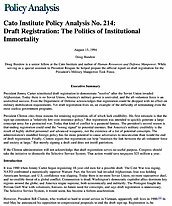President Jimmy Carter reinstituted draft registration to demonstrate “resolve” after the Soviet Union invaded Afghanistan. Today there is no Soviet Union, America’s military power is unrivaled, and the all-volunteer force is an undoubted success. Even the Department of Defense acknowledges that registration could be dropped with no effect on military mobilization requirements. Yet draft registration lives on, an example of the difficulty of terminating even the most useless government programs.
President Clinton cites three reasons for retaining registration, all of which lack credibility. His first rationale is that the sign-up constitutes a “relatively low-cost insurance policy.” But registration was intended to quickly generate a large conscript army for a protracted war. Today that kind of conflict is a paranoid fantasy. The president’s second reason is that ending registration could send the “wrong signal” to potential enemies. But America’s military credibility is the result of highly skilled personnel and advanced weaponry, not the existence of a list of potential conscripts. The administration’s muddled foreign policy has far more potential to cause adversaries to miscalculate than would the end of draft registration. Finally, Clinton argues that registration can help “maintain the link between the all-volunteer force and society at large.” But merely signing a draft card does not instill patriotism.
If the Clinton administration will not acknowledge that draft registration serves no useful purpose, Congress should take the initiative to dismantle the Selective Service System. That action would save taxpayers $25 million a year.

This work is licensed under a Creative Commons Attribution-NonCommercial-ShareAlike 4.0 International License.

